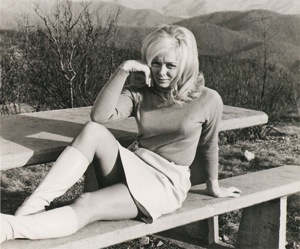
MOVIE REVIEW: Tabloid, the latest documentary from Oscar-winner Errol Morris (The Fog of War, The Thin Blue Line), couldn’t have arrived at a more appropriate moment. While Britain is immersed in an epic scandal involving the relentless, creepy and illegal overreach of its most popular tabloid newspaper The News of theWorld, Morris’ film showcases a sex scandal that provided cannon fodder for Britain’s tabloid wars almost 35 years ago.
The unintentional irony of Morris’ film is that he focuses on the tabloidy, if amazing and hilarious, aspects of the story – its protagonist’s delusions, the almost impossible-to-believe details and the sex, sex, sex – while glossing over the enormously shady ways that the tabloids used and abused the people involved in the scandal. Joyce McKinney, the colorful, charismatic, sexy and maybe a little crazy center of it all, ends up as fodder for Morris, too. As she was in 1977, McKinney is an expendable casualty in the service of a story told for profit.
McKinney became famous for what is known as “The Case of the Manacled Mormon.” In 1977, she traveled from Los Angeles to Surrey in southern England, where she found and absconded with her ex-boyfriend, a Mormon missionary named Kirk Anderson. After a few days of what McKinney says was lovemaking and light, spiritual bondage (long story) in a nearby cottage, the missionary returned to his temple and then reported to the police that he had been kidnapped at gunpoint, tied to a bed and raped.
Not just the mixture of sex, religion and gender expectations fueled the ensuing scandal, but also, and perhaps mostly, by McKinney herself. A stunning blonde beauty queen, she was enormously articulate, funny and eccentric. In a defensive monologue at a court hearing, she said about her love for Anderson, “I’d ski naked down Mount Everest with a carnation up my nose if he asked me.” She insisted that Anderson went with her willingly and that he had been brainwashed by the Mormon church.
In her interviews with Morris, the still beautiful McKinney is captivating. Her Southern drawl, expressive and occasionally giddy storytelling, and her inspired self-justification, all combine to make her a documentarian’s dream. Aside from the pilot she rather inexplicably hired to help her “save” Anderson – a pilot whose crush-ful memories of McKinney and her see-through blouses in 1977 are adorable – the other interviewees are not used for entertainment as much as for information, particularly as rebuttal.
Two tabloid reporters, Peter Tory for The Evening Standard and Kevin Gant for The Daily Mirror, recount their dealings with the story, and both mock McKinney and her claims. Tory refers to her as “barking mad” while Morris is heard laughing off camera. And Gant gleefully describes the illegal ways that he went about trying to prove that McKinney was, among other things, a nude model and a prostitute. Without comment from anyone but McKinney, Gant’s behavior is left seeming to be almost ethical, even though he broke into her house and stole her phone records to get his “story.”
It is striking how similar Gant’s crime is to what brought down The News of the World and is threatening to bring down its various executives at News Corp. Morris does nothing so evil, and he is not a journalist as much as he is an auteur and an entertainer. His trademarked splicing of archival images with raw interviews and his use of pregnant pausing and black screen help propel the story and the laughs. By the end of the film, as entertaining as it is however, I saw the lonely, weird McKinney as too sympathetic to laugh at.
Tabloid
Directed by Errol Morris
Featuring Joyce McKinney, Peter Tory
and Kevin Gant
Rated R
Opens July 22
At Landmark Hillcrest
also playing
Harry Potter and the Deathly Hallows: Part 2
It’s finally over.
Almost exactly four years after the seventh and final book in the Harry Potter series was published, the eighth and final movie has arrived. The final book, Harry Potter and the Deathly Hallows, was so long (759 pages in the U.S. edition), the fan base so devoted (and abhorrent of any cuts), and the potential for profits so high (the first six films grossed more than $5 billion) that the filmmakers decided to split the movie into two parts. While this made practical sense, the result is two movies that don’t quite work on their own.
Part 1 was brooding and upsetting, dark and smart. But Part 2, because of what needs to be done, which is a lot of fighting, dying and explaining, ends up a bit jumbled, even rushed. Director David Yates and screenwriter Steve Kloves spend more time on exposition than on the intricacies of the epic Battle of Hogwarts. There are excellent shots – in finely used 3-D – of angry giants and exploding bridges and living fire balls, but little attention is paid to the human costs. Death scenes of some once-major characters seemed perfunctory and the romances tacked on.
Part of the problem is that the original text needed editing, and a lot of it. It all made sense, grammatically and within its own continuity, but there was just too much going on. Of course, a Potter fan like me was perfectly happy to get so much to read and enjoy, but was it great novel? Not so much.
The film is the same way. It’s messy and problematic, but Yates and Kloves have still made an exciting, absorbing, visually stunning and totally satisfying conclusion to a beloved series of films. And while Daniel Radcliffe (Harry), Emma Watson (Hermione) and Rupert Grint (Ron) all had better material in Part 1, they’ve ended the series as superstars. And deservedly so.












